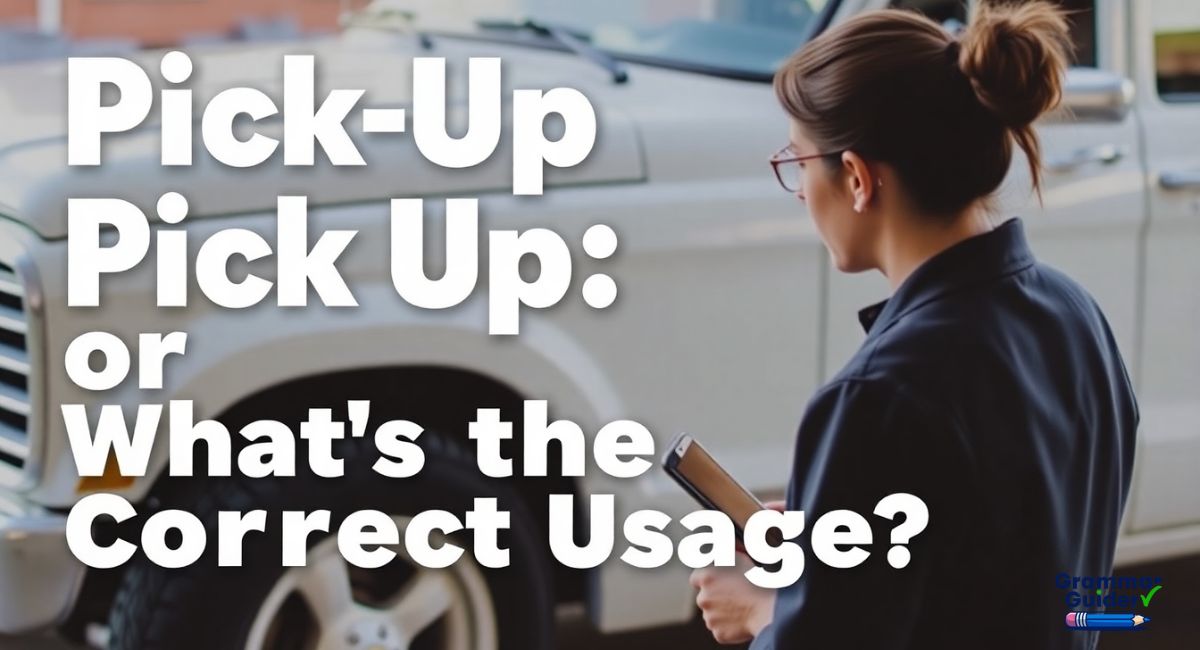In English, some words have slight variations in usage that can be confusing. One such pair is the terms pick-up, pick up, and pickup. Though these terms seem similar, their usage depends on the context, and knowing how to use each one correctly.
It can improve your writing and communication. In this article, we’ll explore the differences between pick-up, pick up, and pickup, providing clear examples, grammar insights, and historical context to help you understand their proper use.
Understanding the Terms
Pick up – The Verb Phrase
The term pick up is a verb phrase consisting of the verb pick and the preposition up. It refers to the action of lifting, gathering, retrieving, or acquiring something. In grammatical terms, this is an action, meaning it expresses what someone does.
- Example 1: Sarah had to pick up the groceries from the store.
- Example 2: Please pick up the phone when it rings.
In both of these examples, pick up refers to an action that involves gathering or retrieving something. This verb phrase is widely used in both casual and formal English.
Pickup – The Noun
When we talk about pickup as one word, we’re referring to a noun. This noun can describe a vehicle type, a scheduled collection, or even the act of acquiring something. The noun pickup is more common in modern English, especially when referring to the vehicle known as a pickup truck.
- Example 1: James drove his pickup truck to the pickup location for the auction items.
- Example 2: The pickup of the parcels is scheduled for 3 PM today.
In these examples, pickup refers to the vehicle and the scheduled collection of items, which are distinct from the verb phrase pick up.
Pick-up – The Hyphenated Noun
The hyphenated form of pick up—pick-up—was once more common in English, especially in older texts. Today, it’s considered somewhat outdated and is used primarily in formal or stylistic contexts. The hyphenated version is typically used when referring to the action or event in certain official or technical contexts, but modern English often prefers pickup instead.
- Example 1: The pick-up service for the auction items will occur at the downtown office.
- Example 2: John called the pick-up service to schedule the collection of the furniture.
While the pick-up form still appears in writing, it’s more common to use pickup without the hyphen in most cases today.
Scenario Examples of Correct Usage
Let’s look at a few scenarios where pick-up, pick up, and pickup are used correctly in context. Each example will show how the term fits into everyday situations.
Scenario 1: Pick Up as a Verb Phrase
Imagine you’ve just bought some groceries and need to pick them up from the store. You could say:
- Email to a friend: Subject: Grocery Pickup Today Hi Emma, I’ll pick up the groceries at the store after work. I’ll let you know when I get home. Let me know if you need anything else. Cheers, Sarah.
In this case, pick up is a verb phrase, indicating the action of retrieving the groceries.
Scenario 2: Pickup as a Noun
Now, let’s imagine you’re arranging for the delivery of some items through a pickup service.
- Email to a courier company: Subject: Request for Pickup Service Dear Delivery Team, I would like to schedule a pickup for tomorrow at 3 PM. The items for pickup are located at 45 Elm Street. Please confirm. Best, John.
In this case, pickup refers to the noun, describing the service or event of collecting items.
Scenario 3: Pick-up as a Hyphenated Noun
Finally, imagine a scenario where you want to refer to a formal event in which items are retrieved. While less common, the hyphenated form might appear in formal writing.
- Email to a client: Subject: Pick-up Details for Your Order Dear Mr. Harris, We’ve arranged a pick-up of your order on Friday at noon. The pick-up will take place at our courier’s office. Should you need any further details, don’t hesitate to contact us. Sincerely, Claire.
Here, pick-up is used in a more formal, stylistic way, though pickup is now preferred in most cases.
Historical Origins and Evolution of These Terms
Understanding the history behind these words helps clarify their current usage.
- The verb phrase “pick up” dates back to the 14th century. It was initially used in the context of physically gathering or lifting items, and its meaning has evolved over time to include figurative uses like acquiring knowledge or improving sales.
- The noun “pickup”, as it refers to a vehicle, first appeared in 1937. Over time, it became more widely used to describe both a specific pickup truck and a collection service.
- The hyphenated form “pick-up” was more common in older English texts but has largely fallen out of favor in modern usage. It still appears occasionally in formal, technical, or stylistic writing.
The Difference Between “Pick Up” and “Pickup”
The most important distinction between pick up and pickup lies in their grammatical function. Pick up is a verb phrase, whereas pickup is a noun. This distinction is central to understanding the correct usage in different contexts.
Common Mistakes
Many English learners struggle with when to use pick-up instead of pickup. The rule of thumb is that pickup is the more modern form, used in most everyday contexts, particularly when referring to vehicles or collection services. Pick-up is outdated and typically only used for stylistic reasons or in more formal contexts. It’s also important to remember that pick up as a verb phrase should be used when talking about the act of retrieving or gathering something.
A Table of Differences
| Term | Part of Speech | Usage | Example |
|---|---|---|---|
| Pick up | Verb phrase | Used to describe an action (gathering, retrieving). | I will pick up the package from the post office. |
| Pickup | Noun | Refers to a collection service or a vehicle type. | The pickup truck arrived to collect the goods. |
| Pick-up | Hyphenated noun | Older, formal usage to describe the event or service. | The pick-up is scheduled for 4 PM at the warehouse. |
FAQ’s
What is the difference between pick up and pickup?
Pick up is a verb phrase, referring to the action of gathering or retrieving something. Pickup is a noun, used for services or vehicles like a pickup truck.
When should I use pick-up instead of pickup?
Pick-up is rarely used today, mostly in formal or technical writing. Pickup is the preferred form in modern English for nouns.
Is pickup always the right choice?
Yes, pickup is the modern and more common noun form, whether referring to a collection service or a pickup truck.
What does pick up mean in a sentence?
Pick up refers to the action of collecting, gathering, or retrieving something, like picking up groceries or picking up the phone.
Is pickup only used for vehicles?
No, pickup can also refer to a scheduled collection service, not just a pickup truck.
How does pickup relate to the history of language?
Pickup originated in the mid-19th century, initially referring to the act of gathering items, and later to the vehicle type that became widely used in the 20th century.
Conclusion
The correct usage of pick up, pickup, and pick-up depends on the grammatical context. Pick up is the verb phrase, referring to the action of gathering or retrieving something. It commonly used when describing the act of collecting objects or performing tasks. On the other hand, pickup is the noun form, commonly used to refer to a collection service, such as a pickup truck or a scheduled pickup. Modern English prefers pickup as the standard noun form, and it’s the most commonly used in casual and formal writing.
The hyphenated form “pick-up” is now considered outdated, though it still appears occasionally in more formal or technical contexts. As language evolves. it’s important to stay up to date with modern usage. When in doubt, using pickup will usually be the best choice for clarity and accuracy, whether referring to a vehicle, a scheduled collection, or the act of acquiring something.

Jacob Harrison is the seasoned writer behind Grammar Insights, with over nine years of experience in the field. Passionate about language, he shares practical tips and strategies to help readers enhance their grammar and writing skills. With a friendly approach, Jacob makes learning accessible and enjoyable for everyone.

